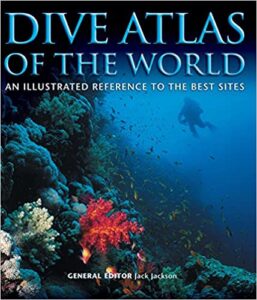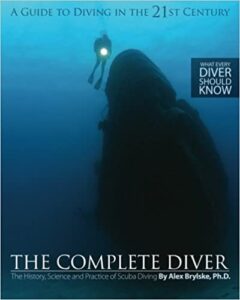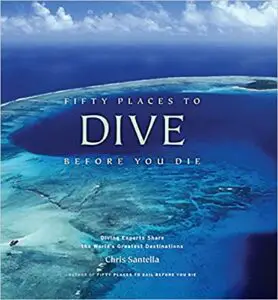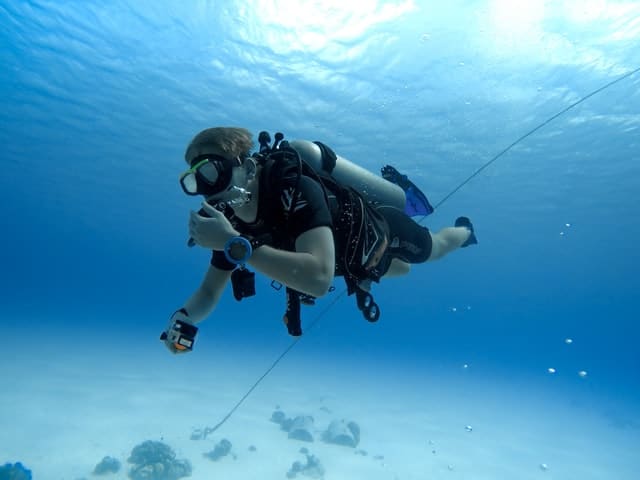Everyone enjoys reading books about their favorite pastime. In this way, scuba divers are no different. Scuba diving is one of the most prevalent activities for both tourists and locals all around the world. While diving may be an incredible experience, it is important to practice safety.
Divers frequently rely only on underwater hand gestures to indicate their discomfort. The ideal approach to learn is to first understand the theory and then pick up advice from skilled divers’ experience.
We’ve compiled a list of the top five books you’ll need to understand all there is to know about diving.
| Books | Title and Author | Our Rating | Check Price on Amazon |
|---|---|---|---|
 | Scuba Fundamental: Start Diving the Right Way By: Simon Pridmore | [su_button url="https://www.amazon.com/Scuba-Fundamental-Start-Diving-Right-ebook/dp/B01D85XYYW?tag=beka3687-20" target="blank" style="default" background="#E03F00" color="#FFFFFF" size="5" wide="no" center="no" radius="auto" icon="" icon_color="#FFFFFF" text_shadow="none" desc="" onclick="" rel="" title="" id="" class=""]Check Price[/su_button] | |
 | Dive Atlas of the World: An Illustrated Reference to the Best Sites By Jack Jackson | [su_button url="https://www.amazon.com/Dive-Atlas-World-Illustrated-Reference/dp/1504800664?tag=beka3687-20" target="blank" style="default" background="#E03F00" color="#FFFFFF" size="5" wide="no" center="no" radius="auto" icon="" icon_color="#FFFFFF" text_shadow="none" desc="" onclick="" rel="" title="" id="" class=""]Check Price[/su_button] | |
 | Scuba Confidential: An Insider's Guide to Becoming a Better Diver By: Simon Pridmore | [su_button url="https://www.amazon.com/Scuba-Confidential-Simon-Pridmore-audiobook/dp/B00R729H4O?tag=beka3687-20" target="blank" style="default" background="#E03F00" color="#FFFFFF" size="5" wide="no" center="no" radius="auto" icon="" icon_color="#FFFFFF" text_shadow="none" desc="" onclick="" rel="" title="" id="" class=""]Check Price[/su_button] | |
 | The Complete Diver: The History, Science, and Practice of Scuba Diving By: Alex Brylske Ph.D. | [su_button url="https://www.amazon.com/Complete-Diver-History-Science-Practice/dp/0615721338?tag=beka3687-20" target="blank" style="default" background="#E03F00" color="#FFFFFF" size="5" wide="no" center="no" radius="auto" icon="" icon_color="#FFFFFF" text_shadow="none" desc="" onclick="" rel="" title="" id="" class=""]Check Price[/su_button] | |
 | Fifty Places to Dive Before You Die: Diving Experts Share the World's Greatest Destinations By: Chris Santella | [su_button url="https://www.amazon.com/Fifty-Places-Dive-Before-You/dp/158479710X?tag=beka3687-20" target="blank" style="default" background="#E03F00" color="#FFFFFF" size="5" wide="no" center="no" radius="auto" icon="" icon_color="#FFFFFF" text_shadow="none" desc="" onclick="" rel="" title="" id="" class=""]Check Price[/su_button] |
How Long Does It Take to Get a Diving Certification?
If you want to take the online course and study diving at home, the procedure will be sped up. What about the four open-water dives? They typically last two days.
Three to four days is very typical. If you want to get certified closer to home, several dive shops provide activity in the evenings or on weekends to meet work and school programs, making it a couple of periods in one day a week for a month or so.
Best Diving Books – TOP 5 CHOICE
OUR NUMBER 1 CHOICE
[wp-review id=”3473″]
The Contenders
[su_service title=”Dive Atlas of the World: An Illustrated Reference to the Best Sites By Jack Jackson” icon=”icon: star” icon_color=”#2D3092″ size=”32″ class=””][/su_service]

The Dive Atlas of the World takes you on a globe tour of notable dive locations that have been reported and photographed by professionals. This worldwide collection provides the discriminating diver a feast of destinations to choose from, ranging from well-known classics to spots that have just recently been discovered.
You’ll discover well-written, clearly plotted reports of the best sites to go for these dives. You won’t want to arrange your next dive without first consulting this thorough reference to the world’s most exciting underwater sites.
Each part is accompanied by a numbered map that shows each dive point within that section. Each map highlights important local landmarks. Dive Atlas of the World is jam-packed with hundreds of stunning photographs captured by notable professional photographers, including the author himself.
[su_service title=”Scuba Confidential: An Insider’s Guide to Becoming a Better Diver By: Simon Pridmore” icon=”icon: star” icon_color=”#2D3092″ size=”32″ class=””][/su_service]

Scuba Confidential is a one-of-a-kind book jam-packed with useful hints and professional guidance. offering you unique access to the diving pros’ and technical divers’ secrets.
It provides an informed, balanced perspective on some of the most controversial problems in scuba diving. This book also provides useful information on a wide range of topics, such as what it’s like to take a cave diving school.
This is straightforward, no-nonsense instruction from a professional who has been engaged in practically every element of the sport over the previous three decades.
[su_service title=”The Complete Diver: The History, Science, and Practice of Scuba Diving By: Alex Brylske Ph.D.” icon=”icon: star” icon_color=”#2D3092″ size=”32″ class=””][/su_service]

This book takes an in-depth look at the sport of scuba diving. It is a must-read not just for new divers and coaches, but also for anybody who likes diving and ocean exploration.
It is an interesting history of underwater exploration that explores the most recent technological breakthroughs. If you read this book, you will be able to delve further into the great expanse of water in the future.
The author is the most widely published author in the subject of leisure scuba diving and one of the diving industry’s most powerful voices.
[su_service title=”Fifty Places to Dive Before You Die: Diving Experts Share the World’s Greatest Destinations By: Chris Santella” icon=”icon: star” icon_color=”#2D3092″ size=”32″ class=””][/su_service]

This book has asked diving professionals from all around the world to share their favorite dive spots. The book guides divers to hotspot locations. As they turn each page of this book, readers will go on a new journey.
It has stunning shots of species recorded in 40 magnificent color photographs from the world’s best underwater photographers. Divers may see many underwater treasures for themselves, either on location with their diving gear or from the comfort of their couch.
Chris Santella writes for the New York Times, the Washington Post, and Trout.
When you go Diving, there are a Few Things you Should Know

☆ Make Sure You Are Dive-Certified
Relying on the type of dive, some dive operators need verification of dive certification or specialty expertise. Before you go or start diving on your trip, always bring your dive certification from a certified dive operator.
Some operators supply beginner diving activities; however, this does not allow you to dive anytime and anywhere you wish.
☆ Check to See if You’re Suitable to Dive
If you’ve never dived before, you should have a medical check in your home country to guarantee you’re qualified to dive. If you’re generally fit and healthy, you should be OK. Before understanding how to dive, you will be needed to sign a medical directive.
If you’re already qualified to dive, dodge diving if you’re not feeling good. Don’t dive if you have a cold or a hangover, in particular.
☆ Dive with a Professional Diving School
Look on the web for recommended diving schools in the area you’re visiting. It is vital to know that they are well-established and have well-maintained diving equipment and boats, as well as skilled staff.
Whether English is not your first language, see if they have instructors who are proficient in your language.
☆ Pay Attention to Your Instructor
No matter how skilled you are, it is critical to listen to your guide once you board the diving boat. One guideline of dive preparation is to listen to your instructor’s instructions on where you’re heading.
The path you will take and what you must be aware of requiring the assistance of a teacher.
☆ Double Check All of Your Scuba Gear
When you arrive at the dive location, you will need to set up all of your diving equipment. Take your time and double-check that everything is in working order.
☆ Make Certain you Perform Your Buddy Check
Present yourself to your friend ahead of time so you can get to know each other a bit better. It’s healthier for you both in terms of safety, and it may also be the start of a wonderful friendship.
It is critical to perform a companion check of each other’s diving gear before entering the water to guarantee that neither of you has overlooked anything.
☆ Breathe Normally
Scuba diving is a unique and exhilarating experience because you are doing something impossible: breathing underwater. You must NEVER hold your breath.
Holding your breath can result in an air embolism, potentially fatal damage.
☆ Keep an eye on your air Pressure Gauge
You can only stay down for as long as you have air in your tank, and you must be mindful of when your tank is half full to plan your retrieval to the surface.
Your instructor will regularly ask you how much air you have left, but you are eventually accountable for your own air use.
☆ Don’t Push Yourself Too Far
Diving is commonly referred to be an adrenaline sport, although you should be relaxed while underwater.
Avoid moving at a pace that causes you to become out of breath. If you get tired, alert your buddy and pick a coral-free rock to rest on.
Diving Logbook and its Advantages
You’ve started your diving adventures. You are now classified as an intermediate diver. It’s quite simple to progress from novice to skilled diver: keep a dive journal.
● Determine How Much Weight you Require
You could always ask your divemaster for assistance calculating your weight every time you dive, but it’s preferable to be self-sufficient.
A diary is used to keep track of how much weight you require with various combinations of gear. This will save you time, help you determine the proper amount of weight, and increase your buoyancy.
If you want to become a wonderful diver, the first step is to perfect your buoyancy.
● Notes on Equipment Requirements and Repairs
If you frequently forget your snorkel or food add a note in your logbook. You may also take notice of any needed repairs after a dive while the experience is still fresh in your mind.
● Keep Track of Your Achievements
More demanding dive sites and advanced dive courses may need a certain number of logged dives. You don’t want to limit your diving options because you don’t have enough documented experience.
Track your dives in your logbook in case you need proof later.
● Keep track of Marine Life Sightings
Great divers are always discovering and sharing what they see and do on their dives. Make a list of the marine creatures you see so you can check it up when you get back to shore.
Improve your fish and animal identification skills so you can share them and help others have a better diving experience.
● Remember your Journeys
An updated journal is a lovely present for your future self. The days you spend diving may be the happiest and most exciting of your life.
Write down all of your experiences, keep note of the things you learned, and strive to improve since doing so will inspire you to pack your dive bag and go on another trip.
The Advantages of Reading Books

✔ Exercise for the Brain
Reading is a lot of enjoyment for a lot of individuals, but it also offers a lot of mental health advantages in terms of thinking and comprehending.
It engages your brain and cognitive skills by focusing on the words and plot. This type of stimulus can help sharpen your intellect, particularly the region of the brain responsible for attention and critical thinking.
Reading sharpens this area of the brain in the same way as sharpening a knife does. This mental sharpening will gradually increase your attention when focused on something vital.
✔ Expansion of Knowledge
When you’re reading, you could come across certain terms that you don’t exactly comprehend or recognize. This perplexity may prompt you to search up the word and learn its definition.
And because you didn’t know the term, to begin with, the process of looking up the definition aids your brain in remembering that new and interesting word. When you read every day, you feed your brain with fresh words and phrases that you would not have learned otherwise.
You may not realize how much your vocabulary has grown after only one day of extensive reading. These terms you’ve been studying will start to make their way into your regular lexicon.
✔ Stress Reduction
Reading is a terrific kind of enjoyment for most people, but what you and those other people may not realize is that it may help decrease stress levels.
You read that information correctly, even though it seems unusual to state. Reading and concentrating on the written word can assist to reduce strain and the stresses of the day. You may relax and let the stress melt away by diverting your attention away from the source of the worry.
Reading can help alleviate the effects of stress by enabling your mind and body to rest. When you start reading, you will begin to focus on the words and plot rather than your tension.
✔ Assists with Depression
Reading can help prevent depressive episodes. Your stress levels activate the area of the brain that contracts with depression when you read.
Reading books can be incredibly useful for someone who has depressed tendencies but does not require medicine. The enjoyment that comes from reading may also enhance your attitude, allowing your day to transition from sad to cheerful.
✔ Improved Focus
Though it has already been noted how reading may increase focus and critical thinking. Reading a little each day can help you focus and remember things better.
Reading, like physical activity, is a sort of cerebral exercise that tests your memory and concentration. Simple reading comprehension helps to boost memory function.
Your brain is continually retaining bits and pieces of information about the tale as you read. Reading improves your attention since it involves concentration.
✔ Improves your Writing Capabilities
Those who write understand the value of reading. Whether you write for a job or pleasure, extensive reading may help you enhance your writing skills and talents.
Reading may assist develop your writing abilities in a variety of ways, and each of these ways occurs without your knowledge.
✔ Improves your Imagination
Although it is not one of the more well-known advantages of reading, it may considerably improve your creativity. Consider the worlds in which you are involved and the characters you meet while reading.
All of this is due to the stimulus of the brain that reading causes. Serious readers will recognize the sensation of becoming engrossed in the worlds of novels.
The imagination is a strong tool that may be applied to almost any facet of life. Though it is not generally addressed, imagination is what permits us to be empathic with others. This empathy can be useful on the job or at home.
✔ Improves your Sleep
Reading, since it allows you to relax and de-stress, can help you fall asleep quickly and peacefully. That may sound too good to be true, but reading can aid you to sleep.
Before going to bed, books are a terrific way to unwind. Reading before bedtime helps to relax your body and mind, especially after a long and hectic day.
One of the many advantages of reading every night before bed is that it might help you relax.
✔ It has the Potential to Make Your Day Better
On a daily level, books may offer you delight. Reading is not only pleasing for your mental and physical health, but it may also brighten your day.
As appealing as meditation and yoga are for brightening your day, spending some time alone with a book is a relaxing way to spend an afternoon or evening.
Your day will be a little brighter, and you will be able to breathe easier. Allow books to lift some of the weight off your shoulders so you may appreciate the things around you.
✔ Broaden your Horizons
Books help you to see things from an entirely new angle. Reading a diving book can assist you to comprehend what that activity has to offer. Books provide you with fresh thoughts.
When you read, you are continually learning, and you might begin to see the world from a more balanced viewpoint.
Frequently Asked Questions
Q: As a beginner, how far can you go diving?
A: For novices pursuing their Open Water certification course or equivalent, the scuba diving depth ranges from 18 meters (60 feet) to 20 meters (65 feet).
Q: What is the most important scuba diving rule?
A: Scuba diving’s Golden Rule Never hold your breath; always breathe properly.
Q: What percentage of scuba divers are Master scuba divers?
A: Having a high level of scuba diving is only attained by less than 2% of dives.
Q: Can you scuba dive if you have a sore throat?
A: At best, you’ll be unhappy as the cold, dry compressed air provokes underwater coughing fits. A little scratchiness is OK, but if you’re having difficulty swallowing, cancel the dive.
Q: Is scuba diving a viable job option?
A: You will make a nice income as a diving professional, but for most, it is about the lifestyle more than the money. Diving can take you somewhere, allow you to explore, and allow you to experience new cultures.
Final Thoughts
Investing in good diving books will not only help you comprehend the sport but will also motivate you. The above mention books are among the most instructive on the market. You will be taken to a new world of diving by reading these books.
